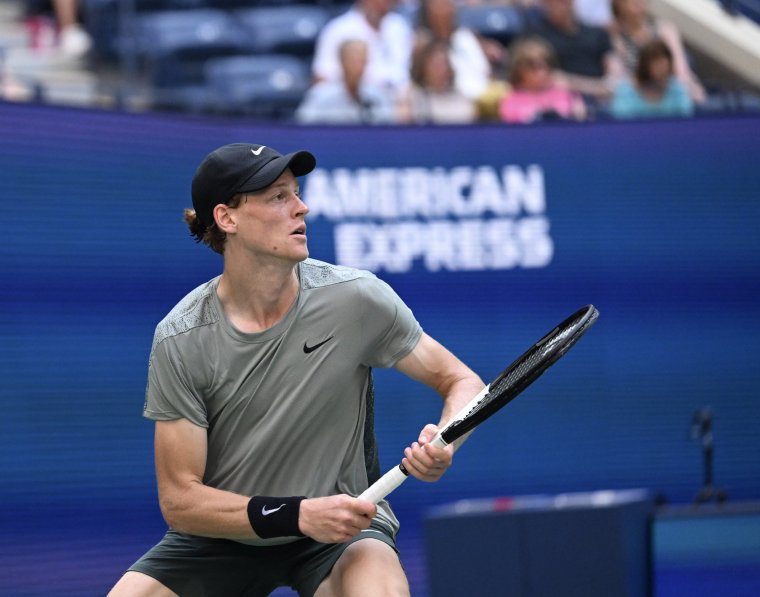Jannik Sinner is not someone who intrinsically courts the limelight.
He may be world No 1, the Australian Open champion and a multi-millionaire who goes out with world No 15 Anna Kalinskaya, but he cuts the figure of a slightly nerdy teenager who would rather hide behind his tousled fringe than flaunt it to the cameras.
You get the impression his dream Saturday night might involve a 10km run, a light hit and video analysis with coach Darren Cahill over dinner.
But over the course of the summer, he has been dealing with the growing anxiety of a doping investigation into two positive tests, taken back in March, for banned steroid clostebol.
The Italian was relieved when the independent panel found he bore no fault or negligence, but did sack the fitness trainer and physio by whose actions the substance got into his system, one supplying the other with a healing spray for a cut on his hand, before he then inadvertently rubbed clostebol into his client’s skin.
That relief was quickly overtaken by fear again, as the news broke and the backlash began. Sinner’s case had been kept secret and he had been allowed to play under investigation, because an initial hearing broadly accepted the initial explanation.
“The reason why I kept playing was because we knew exactly how it entered my system and where it was from. It was in the spray,” Sinner explained in an ESPN interview this week.
The 23-year-old has not shied away from questions, keen to show he has nothing to hide. At his opening press conference, a US Open official crassly tried to shut down any follow-ups to the opening query just a few days after the news broke, before being shouted down by a room full of journalists. Sinner was lucky they did so, because a gagging of the media at that point would have had the opposite effect to what was intended.
Equally, no one could control the reaction of his peers. Publicly, a few quickly jumped on social media to claim preferential treatment, citing the elongated cases of Simona Halep and Tara Moore, who spent years out of the game fighting positive tests.
Sinner, by comparison, had only his points and prize money removed from the tournament – Indian Wells – where he had tested positive and was allowed to play on while the investigation was ongoing.

The blowback, whatever the verdict, had been expected by the authorities who had spent months handling the case, with the complexities of individual instances making such “whataboutery” largely inappropriate.
But for every player posting complaints on social media, there are 10 more fomenting insurrection in an increasingly febrile locker room, i understands.
Novak Djokovic might find his email inbox overflowing in his role as a founding member of the Professional Tennis Players Association (PTPA), a self-styled but as yet unrecognised players’ union on the tour.
“These kind of instances are the very reason that why we founded PTPA that is always advocating for fair protocols, clear protocols for standardised approaches to these kind of cases,” Djokovic said.
“I understand the frustration of the players is there because of lack of consistency. As I understood, his case was cleared the moment basically it was announced. But I think five or six months passed since the news was brought to him and his team.
“So, yeah, there are a lot of issues in the system. We see [a] lack of standardised and clear protocols. I can understand the sentiments of a lot of players that are questioning whether they are treated the same.
“Hopefully the governing bodies of our sport will be able to learn from this case and have a better approach for the future. I think collectively there has to be a change, and I think that’s obvious.”
But it is understood that there are no plans for change or review of the protocols in light of Sinner’s case. The World Anti-Doping Agency have not indicated yet whether they will appeal the decision, but the tennis authorities believe they conducted a robust set of processes. Try telling the players that, though.
Djokovic had a high-profile spat with one at last year’s Davis Cup after he arrived to test him before, rather than after, a match.
Sinner is a generally popular figure but he has become a lightning rod for the animosity held by players who see the anti-doping officials as both incompetent and needlessly awkward to deal with.
“A lot of people are very unhappy,” one well-placed locker room source told i.
Sinner seems unperturbed.
“I cannot really control what they think and what they talk. That’s how everything went and how it was, I already talk, no?” Sinner added.
“I cannot control the players’ reaction, and if I have something to say to someone, I go there privately, because I’m this kind of person. But overall, it has been not bad. So I’m happy about that.”
He will do his best to hide any negative impact but under the microscope of a grand slam, any cracks will start to show.
In his opening round against Mackenzie McDonald, ranked 139 places below him, he won just two of the first nine games. He rallied and only lost four more games in the entire match, but there will be tougher challenges ahead when he cannot afford such a sluggish start. Two weeks is a long time in tennis.




Grindr must act but there are darker reasons why children are on the dating app